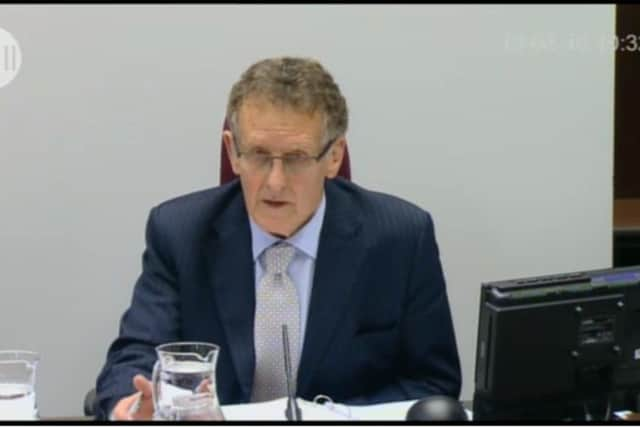RHI inquiry: '˜I never once saw minutes,' says Spad
and live on Freeview channel 276
As the public inquiry delves deeper into the failure of Stormont officials to record key meetings, Andrew Crawford repeatedly insisted that the DUP had never asked for things not to be written down in order to avoid them becoming public under transparency laws, as claimed by the head of the civil service.
Dr Crawford was firmly told by inquiry chairman Sir Patrick Coghlin that he was wrong to describe Mr Sterling’s evidence about minute-taking as “innuendo”. Sir Patrick said: “It’s not an innuendo, so there’s no need to use works like innuendo, that is a fact. Whether you knew it or not will be the subject of the report eventually, but that is a fact.”
Advertisement
Hide AdAdvertisement
Hide AdLater, Dr Crawford was asked if Mrs Foster’s private secretary should have said been saying to him or to the minister that other officials were failing to send her minutes of meetings with the minister, despite being obligated to do so.


Dr Crawford said: “It would be wrong for me to say that in this situation because I never seen [sic] any minutes from any meeting in any department so in this particular case, should [the private secretary] have came [sic] to me ... and said ‘Andrew, I need a minute of that meeting’, bearing in mind that I didn’t do it before, it would be wrong for me to have said I should have done [sic] it in this case.”
Dr Keith MacLean asked whether it ought to have been “blatantly obvious” that minutes from ministerial meetings were never coming back to the minister’s private office.
Dr Crawford said: “I take your point, yes.” He said that he does not recall ever being aware of the requirement for a formal record of meeting involving the minister and for those minutes to be sent to the minister’s office.
Advertisement
Hide AdAdvertisement
Hide AdWhen asked if he ought to have known about it to protect the minister, he said: “I ought to have known that notes weren’t taken of meetings ... but in terms of it coming back down from the energy division to the private office, if I knew minutes were not being taken or notes were not being taken, call it what you may, I would have very much insisted that we get a copy of it...”


Barrister Joseph Aiken said: “The person whose job it was to make the record wasn’t making it, and the person whose job it was to receive the record wasn’t receiving it, and that person, who worked in with the minister and the special advisor ... at no stage, based on what you’re explaining, felt the need to draw to your or the minister’s attention ‘we’re not getting any minutes of any of your meetings’.”
Dr Crawford said the issue was never drawn to his attention but that “key points from meetings that needed followed up” would have been sent to the minister’s office.
Mr Aiken asked: “How did it come to be that neither the official whose job it was to write them or the official whose job it was to receive them ever seem to have been concerned that they weren’t writing them or weren’t receiving them?”
Advertisement
Hide AdAdvertisement
Hide AdDr Crawford said that he did recall private office officials ensuring that those at meetings were taking notes of what was said but “I cannot answer how, if neither was doing their responsibility or duty, I don’t know where that happened or where that originated or where that started”.